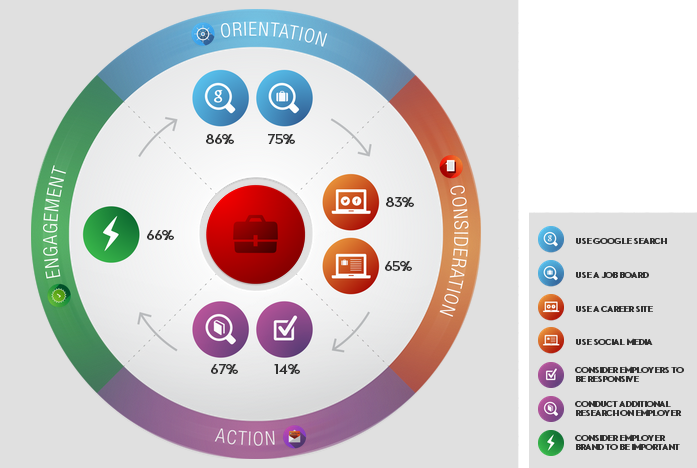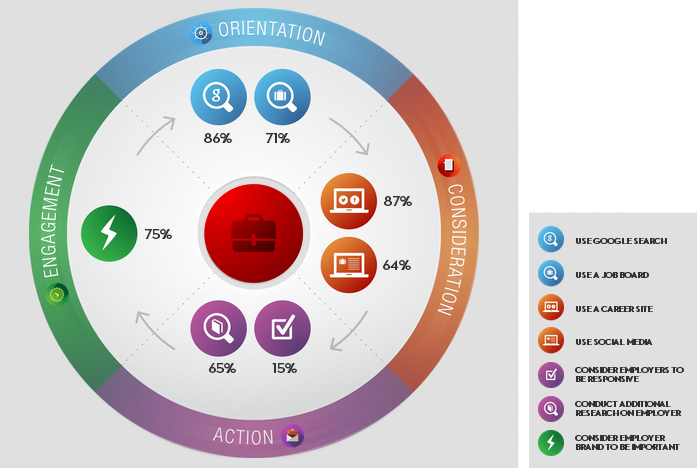
by Fronetics | Nov 25, 2014 | Blog, Internet of Things, Marketing, Social Media, Strategy, Supply Chain

The 2014 UPS B2B Buyers Insight Study found that companies need to have a strong online presence to grow their business.
Buyers are looking for information online
Buyers are conducting research on industrial suppliers online. Sixty-eight percent of buyers research supply purchases via supplier website, and 52 percent use search engines.
In their report, UPS and TNS discuss the importance of a strong online presence:
“Given buyers’ high satisfaction levels with supplier performance on key selection criteria, and considering that web-based research is most preferred, it’s reasonable to infer that many buyers consider online research essential to their supplier selection process. The use of search engines means that suppliers may be at greater risk of losing share to companies whose products are perhaps easier to find, in stock or competitively priced. On the other hand, suppliers whose products are easy to find online and meet buyers’ criteria may also stand to gain customers.”
Being able to buy online is more important to buyers than a sales rep
Being able to access information about products online and being able to make purchases online is more important to buyers than sales representatives and printed catalogs.
Respondents were asked to rate attributes with respect to deciding from which industrial supplies vendor to purchase. Seventy-eight percent of respondents rated product information on the supplier website as “extremely important” or “very important.” Seventy-four percent of respondents rated the ability to make purchases on the supplier’s website as “extremely important” or “very important.” In contrast, fifty-eight percent of respondents rated having a sales representative as “extremely important” or “very important.” Fifty-four percent of respondents rated having a hardcopy product catalog as “extremely important” or “very important.”
Buyers like to purchase through websites
Sixty-three percent of industrial supplies buyers reported that they purchase through websites (directly from suppliers or via a third-party provider).
Sixty-seven percent of buyers responded that the ability to order through a supplier’s website is considered “extremely important” or “very important”
If you think your current customers don’t care if you don’t offer the ability to purchase products online – think again. The survey found that 34 percent of buyers say that they have gone outside of their existing supply base to make an online purchase.
Meet your customers online
Having a strong online presence is an essential component to your business strategy. If you want to grow your business you need to be online. UPS and TNS sum this up nicely:
“Be in the right place when buyers are looking: Having a superior supplier website with stellar functionality means little if buyers can’t find the site or don’t know it’s available. Making sure products and supplier information can be found easily by search engines (SEO), and being visible when buyers search for products (SEM), are essential strategies for retaining and increasing customer base.”

by Fronetics | Nov 25, 2014 | Blog, Internet of Things, Marketing, Social Media, Strategy, Supply Chain

The 2014 UPS B2B Buyers Insight Study found that companies need to have a strong online presence to grow their business.
Buyers are looking for information online
Buyers are conducting research on industrial suppliers online. Sixty-eight percent of buyers research supply purchases via supplier website, and 52 percent use search engines.
In their report, UPS and TNS discuss the importance of a strong online presence:
“Given buyers’ high satisfaction levels with supplier performance on key selection criteria, and considering that web-based research is most preferred, it’s reasonable to infer that many buyers consider online research essential to their supplier selection process. The use of search engines means that suppliers may be at greater risk of losing share to companies whose products are perhaps easier to find, in stock or competitively priced. On the other hand, suppliers whose products are easy to find online and meet buyers’ criteria may also stand to gain customers.”
Being able to buy online is more important to buyers than a sales rep
Being able to access information about products online and being able to make purchases online is more important to buyers than sales representatives and printed catalogs.
Respondents were asked to rate attributes with respect to deciding from which industrial supplies vendor to purchase. Seventy-eight percent of respondents rated product information on the supplier website as “extremely important” or “very important.” Seventy-four percent of respondents rated the ability to make purchases on the supplier’s website as “extremely important” or “very important.” In contrast, fifty-eight percent of respondents rated having a sales representative as “extremely important” or “very important.” Fifty-four percent of respondents rated having a hardcopy product catalog as “extremely important” or “very important.”
Buyers like to purchase through websites
Sixty-three percent of industrial supplies buyers reported that they purchase through websites (directly from suppliers or via a third-party provider).
Sixty-seven percent of buyers responded that the ability to order through a supplier’s website is considered “extremely important” or “very important”
If you think your current customers don’t care if you don’t offer the ability to purchase products online – think again. The survey found that 34 percent of buyers say that they have gone outside of their existing supply base to make an online purchase.
Meet your customers online
Having a strong online presence is an essential component to your business strategy. If you want to grow your business you need to be online. UPS and TNS sum this up nicely:
“Be in the right place when buyers are looking: Having a superior supplier website with stellar functionality means little if buyers can’t find the site or don’t know it’s available. Making sure products and supplier information can be found easily by search engines (SEO), and being visible when buyers search for products (SEM), are essential strategies for retaining and increasing customer base.”

by Fronetics | Jul 22, 2014 | Blog, Supply Chain, Talent
Hiring the wrong person is a costly mistake not only financially, but also in terms of team morale and productivity. Making the right hire is crucial.
Research conducted by the PewResearch Internet Project found that in 2013 73 percent of online adults used a social networking site of some kind. The percentage is even higher for job seekers – 89 percent. Given the high prevalence of use, it is likely that your talent pool is on at least one social networking site. Hiring managers and HR professionals within the supply chain industry should use this reality to hire great supply chain talent. 
Social media is increasingly being used by hiring managers and HR professionals in their hiring process. More than one third of employers use social media in their hiring practices, here’s why you should follow suit.
A study conducted by CareerBuilder.com found that 65 percent of employers who use social media to screen candidates do so to see how the candidate presents themselves professionally. Fifty-one percent of employers used social media to see if the candidate would be a good match for the company’s culture, and 45 percent reported that they used social media to further research the candidate’s qualifications.
Of those employers who use social media in their hiring process, 34 percent reported that they found content that resulted in them not hiring a candidate. Close to 50 percent of reported that they did not hire a candidate because of inappropriate material in their profile, and 45 reported they did not make the hire because of indications of drinking and/or drug abuse. Other negatives found by the employer were poor communication skills, criticizing former employers, and making prejudicial comments.
A candidate’s social media profile and use can also provide employers with information that can push a candidate to the top of the list. Approximately 29 percent of employers reported that they hired a candidate because their social media profile supported professional qualifications and/or contained a great reference about the candidate. Additionally, employers reported that they hired a candidate because their social media profile showed that the candidate was creative, well-rounded, or had great communication skills.
One thing to keep in mind – all information found online and via social media needs to be treated in the same manner as information found via traditional sources. All hiring practices must abide by state and federal laws relating to fair and equal hiring.
Social media is a great tool that can assist hiring managers and HR professionals hire great talent.

by Fronetics | Jul 22, 2014 | Blog, Supply Chain, Talent
Hiring the wrong person is a costly mistake not only financially, but also in terms of team morale and productivity. Making the right hire is crucial.
Research conducted by the PewResearch Internet Project found that in 2013 73 percent of online adults used a social networking site of some kind. The percentage is even higher for job seekers – 89 percent. Given the high prevalence of use, it is likely that your talent pool is on at least one social networking site. Hiring managers and HR professionals within the supply chain industry should use this reality to hire great supply chain talent. 
Social media is increasingly being used by hiring managers and HR professionals in their hiring process. More than one third of employers use social media in their hiring practices, here’s why you should follow suit.
A study conducted by CareerBuilder.com found that 65 percent of employers who use social media to screen candidates do so to see how the candidate presents themselves professionally. Fifty-one percent of employers used social media to see if the candidate would be a good match for the company’s culture, and 45 percent reported that they used social media to further research the candidate’s qualifications.
Of those employers who use social media in their hiring process, 34 percent reported that they found content that resulted in them not hiring a candidate. Close to 50 percent of reported that they did not hire a candidate because of inappropriate material in their profile, and 45 reported they did not make the hire because of indications of drinking and/or drug abuse. Other negatives found by the employer were poor communication skills, criticizing former employers, and making prejudicial comments.
A candidate’s social media profile and use can also provide employers with information that can push a candidate to the top of the list. Approximately 29 percent of employers reported that they hired a candidate because their social media profile supported professional qualifications and/or contained a great reference about the candidate. Additionally, employers reported that they hired a candidate because their social media profile showed that the candidate was creative, well-rounded, or had great communication skills.
One thing to keep in mind – all information found online and via social media needs to be treated in the same manner as information found via traditional sources. All hiring practices must abide by state and federal laws relating to fair and equal hiring.
Social media is a great tool that can assist hiring managers and HR professionals hire great talent.

by Fronetics | Jul 16, 2014 | Blog, Manufacturing & Distribution, Marketing, Social Media, Strategy, Supply Chain, Talent, Warehousing & Materials Handling
According to the 2013 CareerBuilder Candidate Behavior Study, job seekers looking for a position with the manufacturing, transportation, and warehousing industries are using the internet and social media not only to look for jobs, but also to research companies within these industries.
Candidates use the internet and social media throughout their job search
The CareerBuilder study looked at the behavior of candidates throughout the four phases of their job search (orientation, consideration, action, and engagement) and found that the internet and social media were used throughout each of the phases. (See Figure 1 for a definition of each of the four phases.)
Figure 1: The four phases of the the job search
 Source: 2013 CareerBuilder Candidate Behavior Study
Source: 2013 CareerBuilder Candidate Behavior Study
Job seekers in the orientation and consideration phases have not yet applied for a job at your company. Instead they are assessing the market, learning about an industry, and learning about companies within the industry. These stages are very much knowledge seeking phases for the candidate. Companies who are positioned right can attract great talent during these phases. However, companies who do not have a strong online presence and who do not participate in social media will not catch the eye of job seekers. Think of it as speed dating – you only have a short period of time to make an impression. According to the Neilson Norman Group you have 10 to 20 seconds to make that great impression. If you don’t make a great impression during those few seconds the user will navigate away from your website. Therefore you need to make sure that your website is visually engaging, easy to navigate, and contains quality and informative content.
When a candidate reaches the action stage they not only apply to jobs, they also conduct more in-depth research about a company, and form opinions based on the application experience. Candidates are not afraid to share their experience with the application process. Fifty percent of candidates share bad experiences with others and 64 percent share positive experiences.
In the engagement stage candidates interact with employers, interview for positions, and consider offers. Ninety-one percent of candidates believe employment brand plays a role in their decision whether or not to apply – therefore it is at this stage where your company’s online presence and participation in social media pays off.
How do candidates looking for a position within the manufacturing, transportation, and warehousing industries approach their job search? Let’s look.
Manufacturing industry
As shown in Figure 2, within the orientation stage, 85 percent of candidates looking for a job within the manufacturing industry turned to Google and 75 used a job board. In the consideration stage 83 percent used a company’s career site and 65 percent used social media to learn more about the company.
In the action stage 67 percent of candidates reported that they conducted additional research on an employer. In this stage only 14 percent of candidates reported employers in the manufacturing industry to be responsive.
Finally, looking at the final stage of the candidate’s journey, 67 percent reported that they felt the employer brand to be important.
Figure 2: The four phases of the job search; manufacturing industry

Source: 2013 CareerBuilder Candidate Behavior Study
Transportation and warehousing industries
Figure 3 shows that within the orientation stage 86 percent of candidates looking for a job within the transportation and warehousing industries turned to Google and 71 percent used a job board. In the consideration stage 87 percent used a company’s career site and 64 percent used social media to learn more about the company.
In the action stage 65 percent of candidates reported that they conducted additional research on an employer. In this stage only 15 percent of candidates reported employers to be responsive.
In the engagement phase, 75 percent of candidates reported that they felt the employer brand to be important.
Figure 3: The four phases of the job search; manufacturing industry

Source: 2013 CareerBuilder Candidate Behavior Study
In the end
Candidates looking for jobs within the manufacturing, transportation, and warehousing industries are using the internet and social media. They are researching these industries and researching companies within these industries. They are forming opinions, acting on these opinions, and sharing their opinions with others.
If the manufacturing, transportation, and warehousing industries want to attract great talent and retain their interest throughout a candidate’s job search they need to invest in their online presence and become active in social media.






